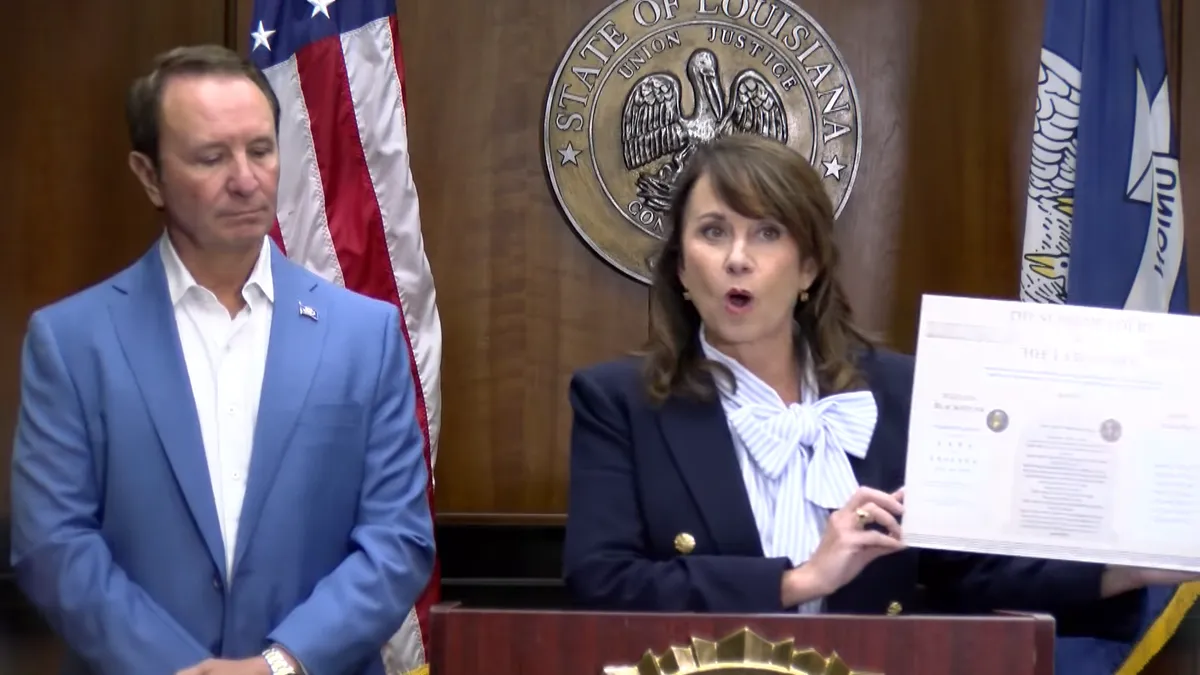Dive Brief:
-
Louisiana Attorney General Liz Murrill asked a federal judge on Monday to allow the state to push forward with a law requiring schools to display the Ten Commandments in every classroom while a lawsuit brought by the American Civil Liberties Union and other civil liberties groups advances.
-
"Those school districts that heed the advice and counsel of the attorney general … will be absolutely successful in upholding this law." Louisiana Gov. Jeff Landry told a Monday press conference.
-
Murrill stressed that the posters are a way to bring "order" back into public schools at a time when there is a "lack of discipline" She said they are "not very big" in size, and Landry added that if nonreligious parents and children, or those who otherwise object to the posters, "find 'em so vulgar, tell the child not to look at it."
Dive Insight:
Roake v. Brumley, filed June 24, is a First Amendment lawsuit on behalf of Christian, Jewish and nonreligious parents and their children attending public schools. It claims the Louisiana Ten Commandments law violates their rights to raise their children according to their beliefs and would coerce students to follow the religious text.
Landry said in the press conference that the public should instead view the Ten Commandments "from a moral perspective" and "place our faith in those moral commandments."
Late last month, a federal court order prevented Louisiana public schools from immediately implementing the law, which goes into effect Jan. 1.
The dispute over the constitutionality of displaying religious texts in classrooms comes after a U.S. Supreme Court decision in 2022 further blurred the line between church and state in public schools.
In that case, Kennedy v. Bremerton School District, a Washington school district was sued for firing a high school football coach after he prayed on school grounds during and after games, including with students. The justices ruled against the school district and said it could not prove that the coach had directly coerced the students into prayer.
However, in 1980 ruling in Stone v. Graham, the Supreme Court struck down a Kentucky law similar to Louisiana's current law requiring the Ten Commandments to be displayed in classrooms. The justices deemed the Kentucky law as unconstitutional because it had "no secular legislative purpose" and was "plainly religious in nature."
In another recent case born out of blurred church and state lines, the Oklahoma Supreme Court ruled that a contract creating the nation’s first religious public charter school violated the federal constitution's Establishment Clause.
The charter school board that approved the religious school's creation now plans to challenge that ruling and take its case to the Supreme Court rather than sever its contract with the religious charter school.
Shortly after the state supreme court’s decision in June, Oklahoma State Superintendent Ryan Walters directed all school districts to teach the Bible and keep a copy in every classroom, a mandate that has already been challenged in court. Several school districts have pushed back on that directive by refusing to implement it, earning a warning from Walters that “rogue” administrators will be held accountable.











